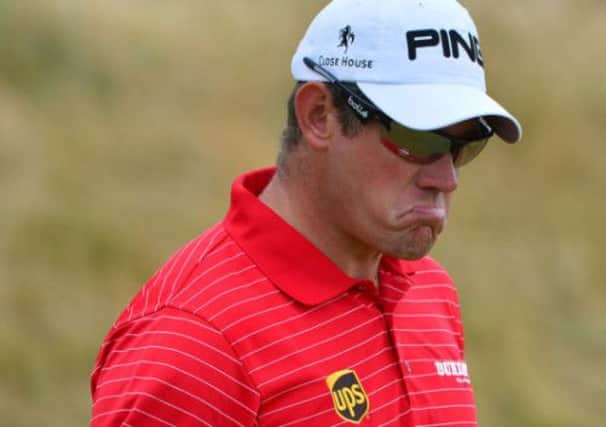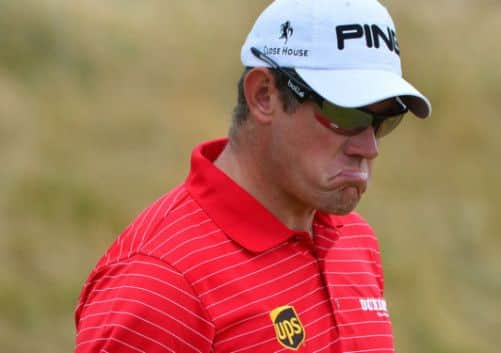Westwood must show resilience of McIlroy and Scott


It was a flippant question, designed to get a rise out of the man who had soared to the top of the world rankings nine months earlier, but was still without that elusive first major.
Westwood ignored the inquisitor as best he could, and rightly so. In golf, as the last three Open champions have demonstrated, major chances do not stop materialising once you pass your 40th birthday.
Advertisement
Hide AdAdvertisement
Hide AdHowever, yesterday, it was hard to escape the feeling that on this occasion Westwood had indeed blown his best chance to lift the Claret Jug.


For all the near-misses he has had in the majors in the last five years, a case can be made for the Worksop professional having been beaten on the day by the better man.
That was the scenario when he missed the play-off for the US Open at Torrey Pines by a shot in 2008 when Tiger Woods always appeared destined to win.
Likewise 13 months later when Stewart Cink burst through the field to deny not only Westwood – who again missed the play-off by a stroke – but also Tom Watson from writing one of the greatest stories in sport.
Advertisement
Hide AdAdvertisement
Hide AdAt Augusta in 2010, Westwood held a one-shot lead going into the final round but Phil Mickelson played sublime golf on the final day, encapsulated by the left-hander’s shot from the pine cones on the 13th to the heart of the green to set up a momentum-shifting eagle.
Westwood was also second at the Open behind runaway winner Louis Oosthuizen at St Andrews later that year, before racking up two more top-three finishes.
On each of those latter occasions he was never really in contention.
Yet at Muirfield he was the man to beat, a position he had never been in before in the Open.
Advertisement
Hide AdAdvertisement
Hide AdOn Friday and Saturday he was peerless as he plotted his way around the scorched links that claimed so many victims.
His reliable long game was back to its best after creaking on Thursday, but with the short stick – so often the difference between winning and losing the big tournaments – he was at last attaining the standards he sets with other departments of his game.
In fact, his scrambling on a course where pars were a good score was of a standard it has not been for a long time.
For the short game, new coach Sean Foley has to take some credit. For his putting, it was a tip from Ian Baker-Finch that finally got Westwood ramming home the putts as he did for birdies on Friday, and pars on Saturday.
Advertisement
Hide AdAdvertisement
Hide AdHe also looked in the best frame of mind he has ever done, relaxed even, almost relishing the pressure as it grew with each passing day.
There was a feeling, certainly for this correspondent, that his time had at last come.
And then came the collapse.
Having birdied the fifth yesterday to establish a three-shot lead, the Open Championship was his to win. But then from the seventh it all started to unravel, with Westwood blaming his ability off the tee for his struggles.
Many will be of the opinion that Mickelson actually went and won the tournament, which is hard to debate given that he birdied four of the last six holes and came from five back at the start of play to land his fifth major.
Advertisement
Hide AdAdvertisement
Hide AdBut a level-par round from Westwood would have been sufficient to at least force a play-off.
It was not a choke to match that of Adam Scott at Royal Lytham last year when he let slip a four-shot lead from the 15th tee with a quartet of bogeys.
Nor was it anything like golf’s blueprint for a collapse, that suffered by Greg Norman under the gaze of Nick Faldo at Augusta 17 years ago.
But Westwood’s 10th top-five finish in a major and 16th top-10 will feel more than any other like the one that got away.
What it does to him mentally will be fascinating to see.
Advertisement
Hide AdAdvertisement
Hide AdScott bounced back quickly from last year’s horror show, as did Rory McIlroy when he blew a sizeable lead at Augusta three years ago.
Yet the question from yesterday’s demise is: will Westwood ever have the mental strength to get across the line?
Does he have what it takes mentally to close out a victory under the greatest of pressure?
There are plenty of positives for him to take from this latest near-miss, his putting and scrambling in particular.
Advertisement
Hide AdAdvertisement
Hide AdBut as to whether he has blown his best chance to win an Open, for now he certainly has.
And as another one slides by, the comparisons with Colin Montgomerie as an honour-laden player to always comes up short in the majors gains more credence.
From the greatest player never to win a major to the most successful player of the last generation or two – Woods. How boring has he become to watch?
He always sports a face like the proverbial smacked backside, but at least he used to attack golf courses.
Advertisement
Hide AdAdvertisement
Hide AdAt least he got the crowd charged with a fist-pump or two when a birdie putt rolled in.
Having climbed back to No 1 in the world after his very public fall from grace in 2009, the one thing missing from the Woods storyline is the major title that will relight the fuse on his bid to overhaul Jack Nicklaus’s tally of 18 titles.
The Tiger of old, who won 14 between 1997 and 2008, would have gone out and won one by now, perhaps not with the dominance witnessed at the turn of the millennium, but with the masterful play and steely stare that frightened the life out of his rivals and set pulses racing in the grandstands.
But Woods has become a man waiting to be gifted his next major title, waiting to benefit from others’ mistakes.
Advertisement
Hide AdAdvertisement
Hide AdGranted, Muirfield was not a course on which to go gung-ho, but there were opportunities to make birdies.
Woods’s conservatism throughout the four days prevented him ever turning the threat of a challenge into a reality.
The driver was the club least used by most players, but there were opportunities to make birdies on the par-five fifth and 17th when the wind was favourable.
Woods was so fearful, either of the course or his errant driving, that he opted to play iron off the tee, which invariably meant he was reaching the green in three where most gave themselves a chance of doing it in two.
Advertisement
Hide AdAdvertisement
Hide AdWoods’s challenge faded on the 17th on Saturday, when while tied for the lead he took an iron to the par five while Westwood went with a driver. Westwood made birdie, Woods bogey. He would never get close again.
Even as Mickelson showed what could be achieved by going on the offensive on the back nine of the East Lothian links, Woods remained surprisingly reticent.
So as “Lefty” reaped rewards he never thought he would enjoy, two of the world’s leading players left Muirfield with some soul-searching to do.